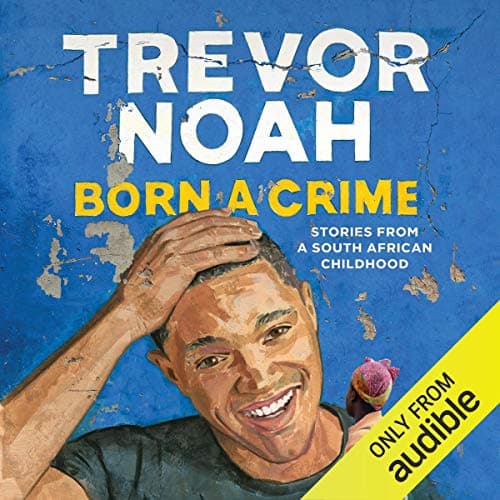Born a Crime by Trevor Noah vs. Sapiens: A Brief History of Humankind by Yuval Noah Harari
Born a Crime by Trevor Noah
I'm a sucker for audiobooks read by the author and this is one of them. Trevor Noah is a skilled comedian and his stories of his growing up in South Africa are genuinely hilarious. It's like listening to a book-length stand up show.
Sapiens: A Brief History of Humankind by Yuval Noah Harari
The great thing about this book is that it takes a big-picture view of human history. It attempts to explain the main themes of human history without getting bogged down in the details. Sapiens also debunks many popular myths about human history, including the one that people today live happier lives and have better diets than our hunter-gatherer predecessors. It comes with an epilogue about the future of humankind in light of ever-accelerating technological progress. With the recent advances in AI it is more relevant than ever. If you're going to read one book on history this year, read this one.


Reviews
Reviews
| Item | Votes | Upvote |
|---|---|---|
| Read by Trevor Noah | 1 | |
| Funny | 1 | |
| Easy listen | 1 |
| Item | Votes | Upvote |
|---|---|---|
| No cons yet, would you like to add one? | ||
| Item | Votes | Upvote |
|---|---|---|
| No pros yet, would you like to add one? | ||
| Item | Votes | Upvote |
|---|---|---|
| No cons yet, would you like to add one? | ||
Frequently Asked Questions
'Born a Crime' is often considered more entertaining due to its comedic storytelling and the engaging way Trevor Noah narrates his experiences growing up in South Africa. The humor and personal anecdotes make it feel like a stand-up comedy show. In contrast, 'Sapiens' is more of an informative read that provides a broad overview of human history, which may not be as entertaining for those looking for a light-hearted experience. Therefore, if you're seeking entertainment, 'Born a Crime' may be the better choice.
'Sapiens' offers a comprehensive overview of human history, exploring major themes and debunking myths, which can provide readers with a deeper understanding of our past. It addresses the evolution of humankind and the impact of technology on our future. On the other hand, 'Born a Crime' focuses on personal stories and experiences rather than a broad historical analysis. Therefore, if your goal is to gain insights into human history, 'Sapiens' would be the more suitable choice.
'Born a Crime by Trevor Noah' is an autobiographical audiobook where comedian Trevor Noah narrates his experiences growing up in South Africa during and after apartheid. The book combines humor and poignant storytelling, making it a compelling listen.
Pros of 'Born a Crime by Trevor Noah' include that it is read by the author, making it an authentic and engaging experience. It is also funny and an easy listen. There are no significant cons listed by users.
'Born a Crime by Trevor Noah' is enjoyable because Trevor Noah's comedic skills shine through in his storytelling. His narration brings his experiences to life, making the audiobook feel like a book-length stand-up show.
'Sapiens: A Brief History of Humankind' by Yuval Noah Harari takes a big-picture view of human history. It explains the main themes of human evolution and development without getting bogged down in details. The book also debunks many popular myths about human history, such as the idea that people today live happier lives or have better diets than our hunter-gatherer predecessors. It ends with an epilogue discussing the future of humankind in light of accelerating technological progress, making it particularly relevant given recent advances in AI.
'Sapiens: A Brief History of Humankind' discusses several main themes, including the cognitive revolution, the agricultural revolution, the unification of humankind, and the scientific revolution. The book explores how these events have shaped human societies, cultures, and economies. It also delves into the impact of technological advancements on the future of humanity.
Yuval Noah Harari is an Israeli historian and professor in the Department of History at the Hebrew University of Jerusalem. He is known for his bestselling books 'Sapiens: A Brief History of Humankind', 'Homo Deus: A Brief History of Tomorrow', and '21 Lessons for the 21st Century'. Harari's work focuses on broad historical processes and their implications for the future.
Pros of 'Sapiens: A Brief History of Humankind' include its broad, comprehensive view of human history and its ability to debunk popular myths. The book is also praised for its engaging writing style and thought-provoking insights. Cons might include its broad scope, which can sometimes lead to oversimplification of complex historical events, and the fact that some readers may find its speculative future predictions less convincing.



















